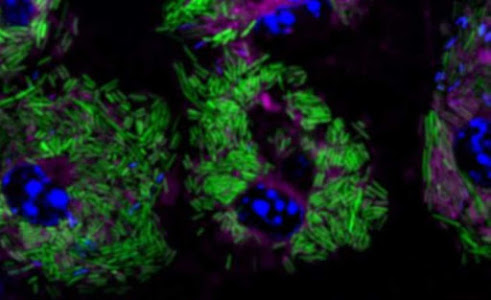 |
| A drug-like inhibitor that stops Listeria from making virulence proteins helps immune cells control and kill the bacteria. Image: Dr Carmen Mathmann |
University of Queensland researchers have unlocked a way of fighting Listeria infections, which can cause severe illness in pregnant women and people with compromised immune systems.
During the study, researchers discovered a way to block Listeria from making the proteins that allow bacteria to survive and multiply in immune cells.
UQ Diamantina Institute’s Professor Antje Blumenthal said using a small, drug-like inhibitor has improved their understanding of the Achilles heel of Listeria.
“Listeria is found in the soil and sometimes in raw foods. Once ingested it can hide from the immune system and multiply inside immune cells,” Professor Blumenthal said.
“Instead of killing the bacteria, the immune cells are used by the bacteria to multiply and are often killed by Listeria growing inside them.
“Our study showed the bacteria could be cleared with a small drug-like inhibitor that targets the 'master regulator’ of the proteins that help Listeria grow in immune cells. The inhibitor helped the immune cells survive infection and kill the bacteria.”
Until now, studies into the ‘master regulator’ – which controls critical proteins that make Listeria virulent – have mostly been based on engineered bacteria, or mutated versions of these proteins.
“By using a drug-like inhibitor, we were able to use molecular imaging and infections studies to better understand what happens to Listeria when the bacteria cannot effectively grow inside immune cells and hide from immune defense mechanisms,” Professor Blumenthal said.
“We hope that our discovery, together with recent research into the master proteins’ molecular structure and functions, could guide the development of inhibitors and new drugs to treat Listeria infection.”
Listeria infection does not cause disease in most people, but can be deadly for the immunocompromised and is also a major health concern during pregnancy and can lead to miscarriage, stillbirth and premature birth.
“Our findings could also inform design of inhibitors against related proteins that are found in different bacteria,” Professor Blumenthal said.
The study has been published in the journal PLOS Pathogens
This study, led by researchers at The UQ Diamantina Institute, included collaborations with Umeå University, Sweden; UQ School of Chemistry and Molecular Biosciences; Australian Infectious Diseases Research Centre; Institute for Molecular Bioscience; Mater Research Institute; Telethon Kids Institute, University of Western Australia; Monash University; University of Melbourne at the Peter Doherty Institute for Infection and Immunity and Hudson Institute of Medical Research.
Source/Credit: University of Queensland
bio012322_03







.jpg)